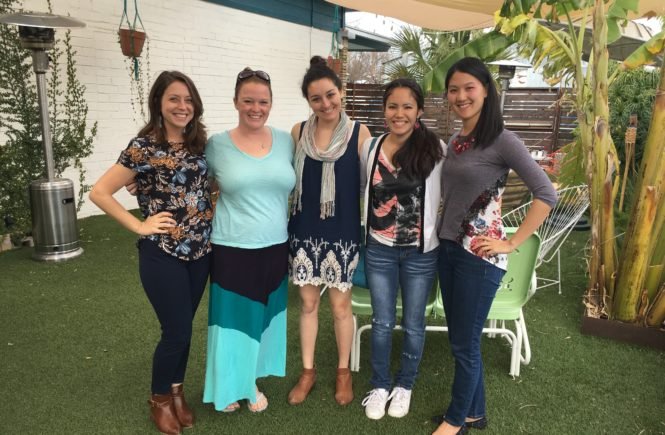It’s the most wonderful time of the year. A season overflowing with joy and gratitude as we reveal in belonging, surrounded by our loved ones. With long-standing family traditions and the anticipation of creating new memories, it all seems so festive, so perfect—but not for everyone. For some, it’s a season defined by grief, reminded of the things that are no longer and the things they have yet to experience.
My Internal Story
I feel so alone.
Fear not, for I am with you.
I feel forgotten.
See, I have inscribed you on the palms of my hands.
I feel abandoned.
I have loved you with an everlasting love.
Grief has been my quiet companion. It waits for me when I wake up and lingers as the day ends. It accompanies me every single day, demanding to be seen, heard, and felt.
With unexpected family turmoil, reminders of hopes deferred, and the pandemic re-exposing deep-rooted racial wounds, I’m tired. Tired of hoping and tired of being disappointed.
“My thoughts are nothing like your thoughts,” says the Lord. “And my ways are far beyond anything you could imagine.”
Isaiah 55:8
This makes me think of Ruth. Her story is one of grief and loss (Ruth 1). She was a widow and an outcast, stripped of all she had and everything she knew. She must have struggled with feelings of loneliness.
I am reminded of Hagar. Betrayal and heartache defined her life. She was disappointed and rejected. It seemed she had been forgotten (Genesis 21).
Then there’s Leah. Her narrative was woven together through disappointment. Those closest to her rejected her (Genesis 29). It seemed she would never experience the love she longed for.
“No eye has seen, no ear has heard, and no mind has imagined what God has prepared for those who love him.”
1 Corinthians 2:9
We all have a story we tell ourselves, and that narrative determines how we interpret our lives. When we’re unable to see past the things we desperately hope for, we miss experiencing God’s presence and the blessings that come with it. But we have a choice. Our experiences can keep us stuck, or they can propel us forward, allowing us to see the beauty amid the storms of life. This year has exposed deep-seated sadness for many of us, and God wants to be invited into those hidden corners of our hearts so He can apply healing balm over our most vulnerable wounds. Jesus gives us space to be human, and the full spectrum of our emotions does not shake Him. He invites us into a refuge that the challenges of life can’t overcome. We are invited to come as we are, but we cannot remain as we were (Romans 12:1–2).
God’s Divine Story
Spending time with God is one way we can overcome our feelings of loneliness. Immersing ourselves in His word reassures us that we are included in a greater narrative. Engaging with Christ reminds us we are loved, perfectly and completely. We were created in the image of connection, and relationship is a defining characteristic of God. Jesus was all about inclusion, and He immersed himself in community. Yet the people Jesus surrounded himself with were outcasts, the rejected, and the unloved. He invited them to live a life different from their plans, and His grace patched together their brokenness. Jesus helped everyone He came in contact with see their circumstances through the lens of His truth. His words conquered disappointments and renewed hope.
Yet, it takes courage to accept our past, be grateful for our present, and remain hopeful for the future. But when we trust God’s timing and purposes for our lives, we’re choosing to be a part of a greater story. We’re beginning to see ourselves, our lives, and God in a new light and changing the way we define our blessings. God has placed desires on our hearts He cares deeply about. He wants us to experience good things. And as we fix our eyes on the Way Maker and rest in His loving embrace, we get to experience His redemptive ways and joy that surpasses our understanding—even in the most challenging of times.
“The LORD’S loving kindnesses indeed never cease, For His compassions never fail. They are new every morning; Great is Your faithfulness.”
Lamentations 3:22-24
God preordains each chapter of our lives—for our eternal good and His glory. The life of Ruth reveals His ever-present help (Ruth 2-4). Her story is woven together with grace as she experienced His redeeming love and was added to Jesus’s lineage. Hagar’s life is a display of His everlasting presence (Genesis 16). God tenderly met her in a place of hopelessness and gave her encouragement and a promise. And because of this, she gave Him a new name, El Roi, The God Who Sees. The life of Leah reflects His unfailing love (Genesis 29). As she experienced heartache, she saw the faithfulness of her God, and through her disappointment, she helped to build the house of Israel.
We see life through a certain lens. It either obstructs our view of God’s goodness and faithfulness or magnifies it. As I redefine my circumstances and reshape the story I tell myself, I am reminded that my present grief doesn’t define my future. God is intimately concerned with every aspect of my life, and when I can’t see His hand, I can always trust His heart.
Blessings
“Now faith is confidence in what we hope for and assurance about what we do not see.”
Hebrews 11:1
I pray you are engulfed with the faith of Ruth when you feel alone, and all seems lost. Cling to the promise of better days to come. I pray your heart is aligned with the hope of Hagar when you feel hurt and abandoned. God sees you, even when no one else does. He will give you hope and a future. I pray you have the trust and perseverance of Leah when you feel overlooked. God hears you and accepts you, just as you are. You are His beloved, the apple of His eye.





